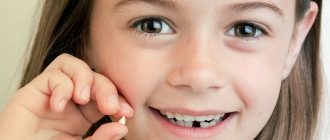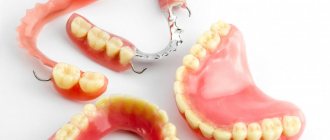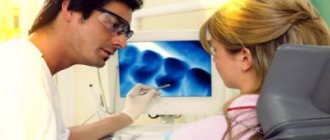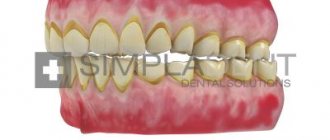There is a proverb: “Having a child means losing one tooth,” and many mothers confirm that after pregnancy the health of their teeth has deteriorated. There is even an assumption that in order for a child to grow, he takes calcium from his mother’s teeth. And although this is just a myth, pregnancy does affect the condition of your teeth, but for completely different reasons.
Firstly, you need to remember that during pregnancy, chronic diseases in a woman’s body often worsen, be it pathology of the pancreas, tonsils or teeth. That is why dentists strongly recommend eliminating all problems in the oral cavity at the stage of pregnancy planning and carrying out sanitation, since even minor caries lesions during 9 months of pregnancy can turn into entire foci of infection. And if you still have to perform certain manipulations during pregnancy, then, if possible, it is better to postpone them to the second and third trimesters.
What happens to teeth and gums during pregnancy?
Most often during this period, women complain of an exacerbation of diseases such as caries, gingivitis, and periodontitis. Each of them can lead to tooth loss if not treated promptly.
Toxicosis can also become a catalyst for carious processes. Nausea and vomiting, as well as changes in eating habits (large amounts of carbohydrates) cause disruption of the acid-base balance in the oral cavity, demineralization of teeth and the development of caries. If you do not sanitize the oral cavity before pregnancy, even minor carious lesions can turn into large lesions within nine months.
During pregnancy, hormonal levels (estrogen and progesterone levels) change and immunity decreases, which can lead to disruption of the gums' response to plaque formation. By leaving ordinary plaque unattended and untreated, you risk causing it to degenerate into tartar, which can damage the entire tooth.
Plaque also causes the development of gingivitis, an infection of the oral mucosa that causes swelling, redness, and bleeding of the gums. Due to altered hormonal levels, any inflammatory reaction in the body of the expectant mother is more violent, which is why the disease is otherwise called “hypertrophic gingivitis” or “gingivitis of pregnant women.” If it is not cured, it can develop into periodontitis, which means that gradual resorption or loss of bone tissue, suppuration of gum pockets and tooth mobility will be added to the listed symptoms.
However, it is still not worth linking a sharp deterioration in oral health with pregnancy. If you maintained proper oral hygiene before pregnancy, regularly attended preventive examinations and had professional cleanings every six months, then all of the problems listed above will most likely not affect you.
It’s another matter if you have never removed dental plaque and have not treated caries. Even if they practically didn’t bother you before pregnancy, during pregnancy the previously “acquired” problems will most likely worsen.
Causes of dental deterioration
Affected masticatory organs are incompatible with pregnancy, since actively progressing caries begins to destroy the mother’s teeth, poisoning her body and the fetus. Low defenses of the body lead to deep caries, pulpitis, and periodontitis. If a tooth is broken, the body may be deficient in calcium. Teeth may crumble, since in the 2nd trimester the need for this element increases due to the formation of the baby’s skeletal system. It takes a lot of mineral to build hard tissue. If there is not enough of it in the mother’s blood, it will be washed out of her bones, incisors, fangs, and molars.
A few respond to this by demineralizing the enamel. This increases sensitivity. The thin enamel layer will be vulnerable, and the chewing organs may become loose. Old fillings can fall out because bacteria easily penetrates under them. What to do, how to stay healthy? If teeth crumble during pregnancy, this fact cannot be ignored. You need to visit a dentist who will develop a suitable therapeutic program. Main causes of problems:
- Hormonal changes, changes in the number of progesterone and estrogen;
- Suppression of the immune system when dental plaque thickens;
- Increased vulnerability of the oral mucosa leads to bleeding gums, and traumatism leads to inflammation and infection;
- “Aggressive” microorganisms are activated;
- The amount and composition of saliva changes, it becomes more acidic, which reduces the protection function;
Can a mother’s “dental” diseases affect the baby’s health?
Sick teeth and inflamed gums are a source of infection for the entire body. From the carious cavity, microbes can penetrate through the root canal into the blood and even provoke disturbances in the functioning of internal organs (heart, kidneys, etc.).
In addition, recent studies suggest that premature birth and the birth of low-weight children may be associated, among other things, with gum disease - an infection in the mother’s body can adversely affect the child’s health. Therefore, preventive dental examinations are extremely important for the health of both the child and the mother.
Symptoms
Hyperesthesia is an instant, painful reaction of teeth to external stimuli:
- cold or hot food;
- air temperature changes;
- sour or sweet drinks;
- spicy or salty foods.
The reaction begins quickly and is accompanied by acute, unbearable pain, but as soon as the stimulus is eliminated, the pain immediately subsides.
Let's figure out what can happen if this disease is not treated in a timely manner:
- Increased pain that will continue regardless of the presence of an irritating factor.
- The list of irritants can grow greatly.
- The spread of hyperesthesia to a large number of teeth, it can develop into a systemic stage.
- The appearance of frequent headaches.
When to visit the dentist and what procedures are allowed?
The best option is to solve all dental problems and have professional cleaning done in advance, before planning a pregnancy, in order to minimize possible risks. But if you have started the situation, and dental treatment during pregnancy cannot be avoided, then you should remember the precautions.
Thus, in the first and third trimesters, you should limit yourself to only urgently necessary procedures, be sure to consult with your gynecologist about anesthesia or taking medications. Based on these recommendations, your dentist should determine the need for hygienic teeth cleaning and therapeutic treatment in the first trimester.
The safest time for dental treatment is the second trimester (14 to 26 weeks). At this stage, all manipulations can be carried out - taking precautions, of course. However, if possible, it is better to avoid introducing pharmaceutical drugs into a woman's body.
During pregnancy, it is highly recommended not to undergo procedures such as implantation and prosthetics, resort to surgical treatment, or remove tartar. This is due to the use of anesthesia.
Women are allowed to treat caries during pregnancy and periodontal diseases, inflammatory processes in the gums and teeth, tooth extraction (non-surgical), and installation of braces (if there is no tooth mobility).
Sensitive teeth - what to do?
Section: About self-care
Tags: useful tips
The bustle of modern cities, regular stress at work, poor eating habits - all these factors cause the acutely widespread problem of increased tooth sensitivity. According to statistics, it affects more than half of the adult population in the world, and in Russia, 62% of people aged 30 to 59 years suffer from this disease1. The consequences can be completely different - ranging from slight irritation while eating ice cream to severe cutting pain that significantly affects life.
What is dentin hypersensitivity?
Dentin hypersensitivity, or in other words, tooth sensitivity, is a short, sharp pain that occurs when the enamel is thinned by certain stimuli and the tooth becomes vulnerable to heat, cold, brushing and other irritants. Hidden beneath the enamel is the hard part of the tooth called dentin. Dentin differs from enamel in that it is penetrated by numerous tubes - dentinal tubules, connected to the nerve center of the tooth. When the enamel is destroyed and thinned or when the tooth root is exposed, the dentinal tubules open, transmitting a pain impulse to the nerve center, which is why unpleasant sensations arise.
| Mechanism of dentin hypersensitivity |
Which toothpaste should you choose?
At any stage of advanced tooth sensitivity, even the most initial stage, you should consult a dentist. Only a professional will be able to study in detail the causes of the problem and tell you about solution methods. Most treatment approaches are only available in the dentist's office, but there are also methods that can be implemented even at home.
At home, you can reduce sensitivity using the process of “desensitization” of nerve endings. Desensitization literally means “deprivation of sensitivity.” It is achieved by using toothpaste with potassium ions, which “discharge” the nerve endings. According to studies, the effect becomes noticeable within two weeks from the moment you start using such toothpastes2.
In the last few years, dentists have increasingly recommended another method of preventing and treating hypersensitivity - closing, or obturation, those same dentinal tubules associated with the nerve center of the tooth. In fact, obturation restores fluid circulation inside the tubule, which ensures the elimination of painful sensations. In this case, to maintain normal condition, it is necessary to use a paste with an obturating component.
The most effective component is calcium hydroxyapatite. Calcium hydroxyapatite is the main building element of enamel and bone tissue of the body, which also promotes the natural process of remineralization of enamel and dentin and clogs dentinal tubules. Some manufacturers use a special type of hydroxyapatite, presented in the form of nano-sized particles. In its usual form, hydroxyapatite is also effective, but its nanoparticle form ensures deeper penetration of the dentinal tubules and their persistent clogging. In addition, studies by some Russian companies prove3 that oral care products with nanohydroxyapatite reduce tooth sensitivity after the first use.
| Various methods of dentin treatment for the treatment of hypersensitivity. a) Tooth after treatment with 17% EDTA, dentinal tubules are open. b) Treatment with 2% sodium fluoride, partial closure of the dentinal tubules. c) Tooth after treatment with nano-hydroxyapatite, d) the combination of nano-hydroxyapatite and 2% sodium fluoride creates complete closure of the tubules and the formation of a layer on the dentin surface. Kunam D. Evaluation of dental tubule occlusion and depth of penetration of nano-hydroxyapatite derived from chicken eggshell powder with and without addition of sodium fluoride: An in vitro study. 2016; 19(3): 239-244 |
Filling open dentinal tubules of teeth after a single use of toothpaste with calcium nanohydroxyapatite
1Ulitovsky S.B., Leontiev A.A., Vilesov A.D., Aleskerov D.Sh., Saprykina N.N. (2015). COMBATING TEETH HYPERSENSITIVITY AT HOME. Problems of dentistry. (2):25-28. DOI:10.18481/2077-7566-2015-0-2-25-28
2Sharma, S., Shetty, N. and Uppoor, A. (2012). Evaluation of the clinical efficacy of potassium nitrate desensitizing mouthwash and a toothpaste in the treatment of dental hypersensitivity. Journal of Clinical and Experimental Dentistry, pp.e28-e33.
3SPLAT Cosmetics LLC (2016). Clinical Study Report on the Properties of Personal Oral Hygiene Products: 4 INNOVA Products. Unpublished data.
Section: About self-care
Tags: useful tips
Is it possible to have x-rays and anesthesia during pregnancy?
Many experts, including those from the American Dental Association, note that if you can avoid X-rays during pregnancy, then it is better to play it safe and refuse this type of diagnosis. The same applies to anesthesia.
However, if x-rays and anesthesia are still necessary, you should resort to them in the second trimester, because in the first trimester, the formation of the baby’s vital organs occurs, and in the third, it is already physically difficult for a woman to perform any procedures. When choosing an anesthetic drug, your dentist should choose anesthetics with minimal amounts of epinephrine.
As for x-rays, the type of examination officially approved for pregnant women and nursing mothers is diagnostics using a dental computed tomograph. The radiation exposure in this case is minimal. In addition, the device gives the doctor the opportunity to accurately identify problems at the earliest stages of diseases, which helps to avoid diagnostic errors and complications.
Advertising
Treatment of caries during pregnancy at Dentistry on Shchelkovskaya
Finally, we will tell you what the main feature of visiting a dentist during pregnancy in our clinic is. The fact is that a pregnant woman is often subject to changes in her emotional state, so our dentists show sensitivity and attention to the patient’s condition, protecting her from any kind of physical pain and emotional stress. The dentists of the clinic on Shchelkovskaya perfectly understand the specific health and emotional background of a pregnant woman, so they do everything in their power to make your visit to the doctor calm and pleasant.
The most important thing that you should not do during pregnancy is to ignore toothache and allow the development of oral diseases. Remember that your baby’s health depends on your vigilance. Therefore, even if you feel slightly unwell, or have periodic aching pains, do not tolerate it, make an appointment with a dentist now! Treatment of caries during pregnancy at any stage of development is possible in our clinic. We work seven days a week, located in the Eastern Administrative District in the Izmailovo district at Shchelkovskoye Highway, building 44, building 5. Near us are Golyanovo, Pervomaiskaya, Partizanskaya, Cherkizovskaya.
How to care for your teeth during pregnancy?
- Limit your consumption of carbohydrates and sweets - they provoke tooth decay.
- Replace sodas with water or low-fat milk and fruit juices with fruit.
- Brush your teeth with fluoride toothpaste and floss twice a day. Special pastes with sage, chamomile, and mint, which have an anti-inflammatory effect, are also effective.
- For frequent attacks of nausea and vomiting, chewing gum without sugar or with xylitol will help you, as well as rinsing your mouth with a soda solution after an attack (1 teaspoon of soda per glass of water). This will neutralize the negative effects of acids on enamel.
So, so that diseases of the teeth and gums do not overshadow the most important period in a woman’s life, you should prepare for it in advance - go to the dentist, get rid of caries and inflammatory gum diseases, and also regularly undergo professional hygienic cleaning.
Dentist consultation during pregnancy
You will need to consult a dentist more than once during pregnancy. It is better to visit the dentist in the first weeks of pregnancy so that, if there are any inflammatory processes in the oral cavity, they can begin timely treatment. It is very important to visit a dentist in the last trimester of pregnancy. At this time, the child’s skeleton and teeth are forming, so right now it is important to carefully monitor the mother’s health.
The teeth of the expectant mother are exposed to some dangers more than those of other patients. During pregnancy, a woman's appetite increases, nausea occurs, and the composition of saliva changes - its acidity increases. All these are favorable factors for the development of bacteria that have a destructive effect on the surface of the teeth.
Choose a clinic based on reviews, don’t go to the first one you come across. It is not so much the proximity to home that is important, but above all the qualifications of the dentist and experience in dental treatment during pregnancy. In our Dentistry clinic on Shchelkovskaya Diamed you will be provided with a full range of services for dental treatment during pregnancy. Don't worry about anything, just make an appointment by calling 8 (495) 221-21-18 or online by filling out the online appointment form. We are located a 7-minute walk from the Shchelkovskaya metro station at Shchelkovskoye Shosse, building 44, building 5. We work seven days a week.











